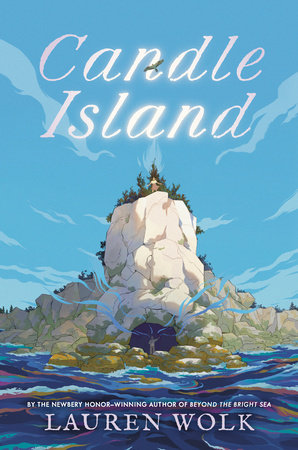Lucretia Sanderson is a 12-year-old who has just lost her father in an awful accident. She and her mother are fleeing Vermont, with the memories it harbors, seeking privacy and anonymity. The two of them are serious painters, and her mother has just broken into the big time by selling a “Sanderson” to the First Lady. But now she is being hounded by the art world, which suddenly wants to know all about her.

“Candle Island” by Lauren Wolk. Dutton Books for Young Readers, 352 pages. Ages 10-12. $18.99
The story opens as they arrive on Candle Island in Maine. Population 315 in winter, 986 in summer, Candle is a mix of different islands but most closely resembles North Haven, whose population triples in the summer with an influx of affluent seasonal residents. The islanders will be recognizable to anyone who has spent time on an island (as author Lauren Wolk has done, visiting them through the Island Readers & Writers project). But Candle’s summer people seem like caricatures, with their golf shirts and giant cabin cruisers from Sag Harbor.
Unfortunately for the Sandersons, they find neither privacy nor anonymity — impossible on an island this size, where everybody knows everybody’s business. Still they find other delights. In the course of the quick-moving story, Lucretia makes friends with an island boy, Bastian, explores the shores and woods, adopts a baby osprey, goes fishing and sailing, rescues a cat stranded on an island and eventually finds the inspiration and solitude she needs to start painting again.
Her mother likes to point out that Picasso claimed he learned to paint like Raphael in four years but “it took him a lifetime to paint like a child.” And in fact this book is really about creativity in children: how it is squelched by adults, how the creative process is nurtured in privacy, how it is eventually shared. And how it is a means of coping with loss and grief.
All the children in the story have some sort of creative gift. In this, they come across less like prodigies than small adults. Lucretia paints like a professional. Bastian, whose secret passion is opera, sings Puccini “like an angel.” Finally, there is Bastian’s cousin Murdock, a fierce and snarky girl who has lost a lot — both her parents and the house she grew up in. She has a gift for poetry.
If all this sounds a bit contrived, it is, as Wolk slyly acknowledges: “Are all the kids on this island creative geniuses?” asks one baffled adult. The ubiquity of genius children is not the sort of thing to bother young readers. But they might have a harder time identifying with 12-year-olds who speak, think and act like adults.
Wolk, herself a painter, has great fun writing about the process. Her prose can be lush, as when Lucretia describes the evening sky as “the first chapter of night, written in starlight.” Or, it can be pared down — and even more powerful — as when Lucretia, missing her father, says, “Being sad was a part of my life. But so was he.”
The plot picks up steam as Lucretia tries to get Murdock to forgive her for the heinous crime of having moved into the house that was once hers. And then the Sandersons’ presence on the island is discovered by a nosy art critic from New York who risks exposing them. With a neat and totally unexpected plot twist, Wolk reveals why they need to guard their privacy so fiercely.
But things don’t get really nasty until Lucretia makes enemies of three rich and spoiled summer kids. Her crime this time? Being an islander. And this is where Wolk lost me.
She gets so many things about island living right: The nosiness and lack of privacy. The big and little details of daily life, from lobstering to ham-and-bean suppers and the “Hair Doctor” who does house calls. The “grouchiness” of the locals who, Lucretia’s assured, will “warm up after a while.” The difficulty fitting in: Lucretia wondering if “we’d be forever from away.” All spot on. So it’s a shame she got the islander-summer person dynamic so wrong.
She portrays summer people as monsters who despise islanders. They toss litter out car windows, and their children vandalize property and harass the island kids. A man in boat shoes and Ray-Bans gives Lucretia “a look that felt like a slap,” while his son’s gaze is “filled with disgust.” Just because she’s an island girl. And when she accidentally trespasses on their private property, the spoiled brats vow to make her life miserable. From there things escalate until the police need to be summoned.
Frictions and resentments between island and year-round populations absolutely exist. But Wolk, a Massachusetts resident whose experience of summer people comes from waitressing on Cape Cod, seems to be confusing tourists — who admittedly often behave badly — with summer residents. In my experience of 20 years summering on an island, most summer residents go out of their way to respect island customs and support the year-round community. Thus Wolk’s depictions of them in “Candle Island” felt — to use her words — like a slap in the face.
You can love this book for its portrayal of Maine island living, its lyrical writing and celebration of the creative life, its old-fashioned (pre-computer) setting and timeless feel, its exploration of art in dealing with loss. Just don’t buy into its island vs. summer person stereotype.
Amy MacDonald is a children’s book writer who lives in Portland and Vinalhaven.
Copy the Story Link

